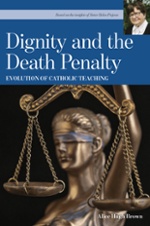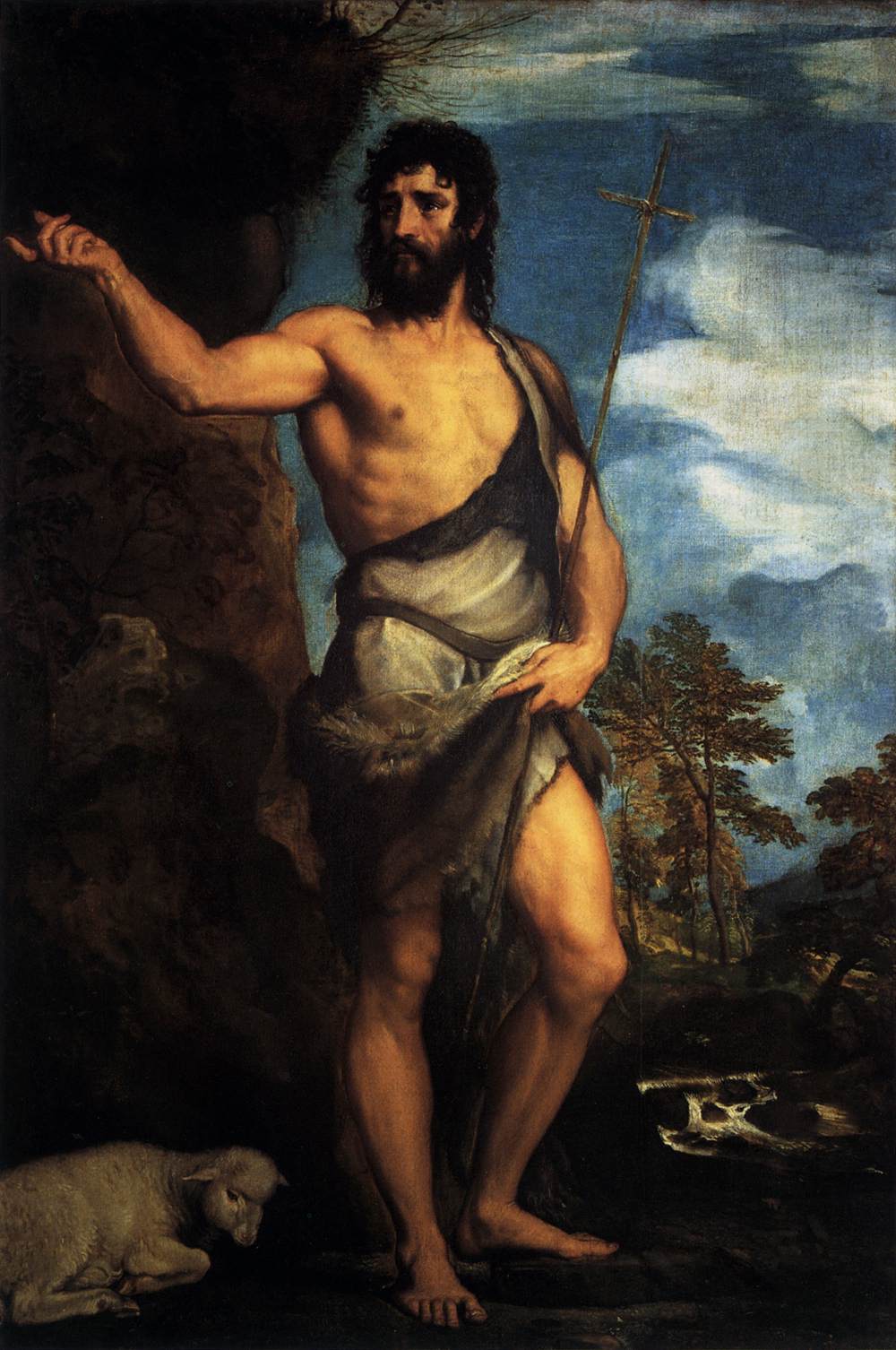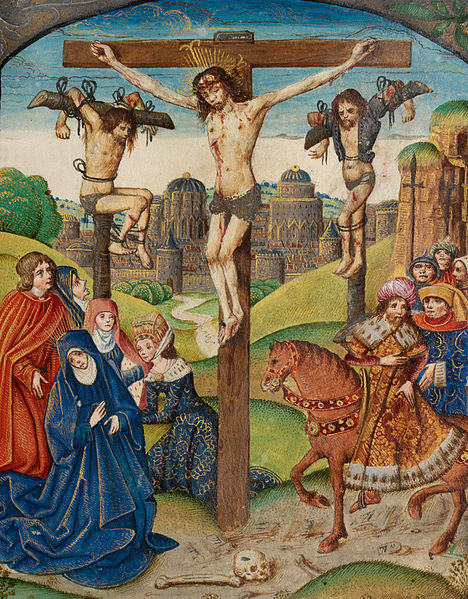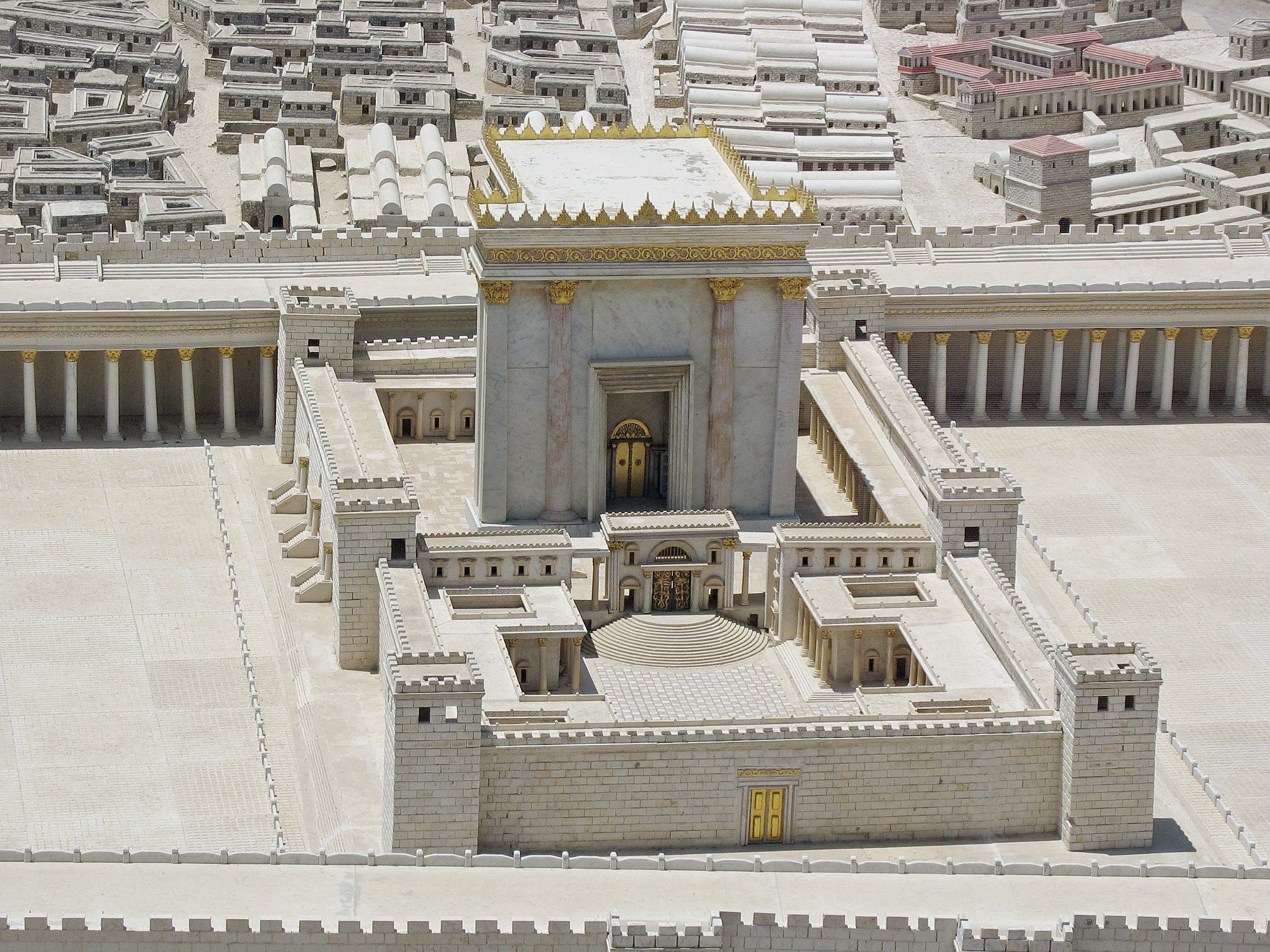Richard Stephen Fairchild (November 17, 1959 – November 17, 2022)

Human Dignity vs. Dehumanization: Determining Mental Culpability
Topics: justice, Catholic social teaching, death penalty, Dignity and the Death Penalty, mental incompetence, mental health
There I sat, in the passenger’s side of our pickup truck, for hours and hours as my husband drove us from Connecticut to our new residence in Royal Palm Beach Florida. Being of short stature, I had the pleasure of the sun in my face when the visors were not long enough; but I also had wonderful views of large birds gliding among the clouds high in the sky above us. I noticed how gracefully they flew, how unencumbered their flights were in contrast to the sometimes jerky, crowded, stop-and-go vehicle traffic below them. I also became aware of how wide open and full the wingspreads of the birds were. Those natural aviators were fully open to the power and directions of the wind currents. While I could not ask the birds their opinions, their travels looked very peaceful and delightful.
So I propose the question to all of us: do we open our wings fully to the power and direction of the Lord? Apart from all the confusion and distractions of our daily lives, are we able to open ourselves up to the love and inspirations from the Holy Spirit? Not one of those birds had its wings open only halfway or one-sided. There was a complete openness to that which would offer efficient and safe propulsion. With the resources of prayer and sacraments, we can get through our busy traffic, and now, the holiday traffic…with a cushion of faith and confidence.
At the same time, we have the joy of the season of Advent when we can try to spread our wings fully, to open up and prepare for the celebration of the Lord’s nativity. It is so easy to get “jammed up” with lists, shopping, decorating, rearranging, parties and party-planning, wrapping, and errands that can really cramp our style. Circumstances can ruffle our feathers! At the end of a busy day, who feels like praying? And yet, what and who should be our real priorities?
I suggest we wrap up a little prayer-time gift for Jesus every day. If we spread ourselves out and lift up our thoughts and imaginations with gratitude and trust in our loving Savior, we can be pleasantly surprised at the gifts we receive, even before Christmas Day! Open up to the Lord!
We might choose to look to St. Paul for some scripture verses to form the bases of our prayer-time gifts:
Do not conform yourselves to this age but be transformed by the renewal of your mind, that you may discern what is the will of God, what is good and pleasing and perfect. (Romans 12:2)
I am confident of this, that the one who began a good work in you will continue to complete it until the day of Christ Jesus. (Philippians 1:6)
Or we might look to Proverbs 3:5-6:
Trust in the Lord with all your heart,
on your own intelligence do not rely;
In all your ways be mindful of him,
and he will make straight your paths.
Let’s take flight this Advent!
Topics: everyday prayer, Advent, Advent prayer, Sharon Krause
"Hear the Word! by Bill Ayres: Second Sunday of Advent
A reading from the prophecy of Isaiah
(Chapter 11:1-10)
The prophets of Israel preached several messages, some hopeful and some judgmental, but all intended to awaken the people of Israel during hard times and give them courage. Here, Isaiah talks about a new leader, a future king. “The spirit of the Lord shall rest upon him: a spirit of wisdom and understanding, a spirit of counsel and strength, a spirit of knowledge and fear of the Lord…. Not by appearance shall he judge, nor by hearsay shall he decide, but he shall judge the poor with justice, and decide aright for the land’s afflicted. Justice shall be the band upon his waist, and faithfulness a belt upon his hips. Then the wolf shall be the guest of the lamb, and the leopard shall lie down with the kid, and the calf and the lion shall browse together, with a little child to guide them.”
The kings that followed the greatest king, David, were far from the image Isaiah presents. They led their country poorly, so Isaiah wants to give the people some hope. We believe that this promised new ruler is Jesus, the Christ, and we place our hope in him.
Responsorial Psalm
(Psalm 72:1-2, 7-8, 12-13, 17)
The psalmist gives us the qualities of a true leader: “Justice shall flourish in his time, and fullness of peace forever.” The psalmist gives us the qualities of a true leader. Would that that were always the case.
A reading from St. Paul's Letter to the Romans
(Chapter 15:4-9)
Paul is writing for both Jews and gentiles who followed Jesus, knowing that these groups did not always get along. “May the God of endurance and encouragement grant you to think in harmony with one another, in keeping with Christ Jesus, that with one accord you may with one voice glorify the God and Father of our Lord Jesus Christ. Welcome one another, then, as Christ welcomed you, for the glory of God.”
Throughout history, there have been differences of opinion among us Christians even to the point that large groups broke away from the Church and formed new denominations. We live in a time of divisions between the old order and emerging challenges in which not doctrine but rather rules and traditions are being questioned. In this atmosphere, we need to keep focused on what Jesus himself preached and practiced, loving God and one another. That has not changed in two thousand years, nor will it ever.
A reading from the holy Gospel according to Matthew
(Chapter 3:1-12)
“John the Baptist appeared preaching in the desert of Judea and saying, ‘Repent, for the kingdom of heaven is at hand…. It was of him that the prophet Isaiah had spoken when he said, ‘A voice crying out in the desert, prepare the way of the Lord, make straight his paths.’”
John must have been a sight to behold. He “wore clothing made of camel hair and had a leather belt around his waist. His food was locusts and wild honey. At that time Jerusalem, all Judea, and the whole region around the Jordan were going out to him and were being baptized by him in the Jordan River as they acknowledged their sins.”
But John was not fooled by the hypocrisy of many of the Pharisees and Sadducees who were coming for baptism. He said to them, “You brood of vipers! Who warned you to flee from the coming wrath? And do not presume to say to yourselves ‘We have Abraham as our father.’ For I tell you, God can raise up children to Abraham from these stones…. I am baptizing you with water, for repentance, but the one who is coming after me is mightier than I. I am not worthy to carry his sandals. He will baptize you with the Holy Spirit and fire.”
John knew his role in life. As popular as he was, he knew that he was to prepare the way for Jesus, not be the message himself. His mission, his very life, was short but essential for the mission of Jesus. Each of us also has a role to play in the living and sharing of our faith. We too are not the message, but we are the messengers.
✝️
Painting: St. John the Baptist in the Desert, Tiziano Vecelli (Titian), circa 1542. Gallerie dell'Accademia, Venise. Public domain.
Excerpts from the English translation of the Lectionary for Mass © 1969, 1981, 1997, International Commission on English in the Liturgy Corporation (ICEL). All rights reserved.
Bill Ayres was a founder, with the late singer Harry Chapin, of WhyHunger. He has been a radio and TV broadcaster for 40 years and has two weekly Sunday-night shows on WPLJ, 95.5 FM in New York. He is a member of Our Lady Queen of Martyrs Church in Centerport, New York.
"Hear the Word! by Bill Ayres: First Sunday of Advent
A reading from the prophecy of Isaiah
(Chapter 2:1-5)
“In days to come the mountain of the Lord’s house shall be established as the highest mountain and raised above the hills…. For from Zion shall go forth instruction and the word of the Lord from Jerusalem. He shall judge between the nations, and impose terms on many peoples.”
The two important points here are that God will “judge between the nations” and that God’s word comes “from Jerusalem.” What is God’s word to the nations? “They shall beat their swords into plowshares and their spears into pruning hooks; one nation shall not raise the sword against another, nor shall they train for war again.” If they do these things, they will “walk in the light of the Lord.”
If only nations obeyed this command, millions of innocent people would not have been killed and many others would not be dying today. Jesus himself preached and lived non-violence as should we, as individuals, as societies, as nations.
Responsorial Psalm
(Psalm 122)
“Let us go rejoicing to the house of the Lord.” Do you and I rejoice when we come for Mass each week, or do we take it for granted and as an obligation rather than a gift worthy of rejoicing?
A reading from St. Paul's Letter to the Romans
(Chapter 13:11-14)
Paul tells the Romans, “For our salvation is nearer now than when we first believed; the night is advanced, the day is at hand. Let us then throw off the works of darkness and put on the armor of light, let us conduct ourselves properly as in the day, not in orgies and drunkenness, not in promiscuity and lust, not in rivalry and jealousy. But put on the Lord Jesus Christ.”
Paul knows that he will be killed and so he wants to let the Roman Christians know how important it is for them to stay the course and not fall into bad habits that were rampant in the city. Of course, the same holds true for we who live in an age that is all too prone to excuse these same excesses.
A reading from the holy Gospel according to Matthew
(Chapter 24:37-44)
After Jesus died many believed that he would come again on the last day. But when? Matthew tells people, “Stay awake! For you do not know on what day your Lord will come. Be sure of this: if the master of the house had known the hour of night when the thief was coming, he would have stayed awake and not let his house be broken into. So too, you must also be prepared, for at an hour you do not expect, the Son of Man will come.”
This belief that Jesus would come back, perhaps in their lifetime, and that the world would then end was very popular among Christians in the decades after the death of Jesus. It was intensified by the constant threat of prison and execution at the hands of the Romans. Even today, there are sects of Christianity that believe that the world will end soon, and Jesus will return. They go up to a mountain or some other remote place and wait until it becomes apparent that the time is not now.
We have no idea when the world as we know it will end, but we do know that our lives here on earth will end at our deaths. We know not the day or the hour. Rather than worrying about that, we should make the most of each day—serving God and each other—as we look forward to a new life forever in the divine presence.
✝️
Excerpts from the English translation of the Lectionary for Mass © 1969, 1981, 1997, International Commission on English in the Liturgy Corporation (ICEL). All rights reserved.
Bill Ayres was a founder, with the late singer Harry Chapin, of WhyHunger. He has been a radio and TV broadcaster for 40 years and has two weekly Sunday-night shows on WPLJ, 95.5 FM in New York. He is a member of Our Lady Queen of Martyrs Church in Centerport, New York.
"Hear the Word! by Bill Ayres: Solemnity of Jesus Christ, King
A reading from the Second Book of Samuel
(Chapter 5:1-3)
In this passage we read that David was called to be king and leader of Israel. The Christian biblical writers saw Jesus as both the successor and the perfection of David’s rule—not only over Israel but over the whole world. These days, most kings and queens have only ceremonial functions where they exist at all. When the Church began observing this solemnity in 1925, it was identifying Jesus with the power still being exercised by royalty in many places but contrasting his eternal rule with the finite dominion of earthly kings. Today, we recognize that Jesus' kingdom embraces all mankind, but we focus too on the loving, healing aspects of his power.
Responsorial Psalm
(Psalm 122)
“Let us go rejoicing to the house of the Lord.” Do you and I rejoice when we come for Mass each week, or do we take it for granted and as an obligation rather than a gift worthy of rejoicing?
A reading from St. Paul's Letter to the Colossians
(Chapter 1:12-20)
“He is the head of the body, the church.” This is a central teaching of our faith, that there is a bodily connection between Christ who is the head of the body, and the Church, which is itself the body of Christ. You can’t get any closer. “In him were created all things.” Everything was created in and for Christ. This was a hymn in the early Church, and it reflected what the followers of Jesus believed from the beginning and what we believe and experience in the assembly of the Church and in the Eucharist.
A reading from the holy Gospel according to Luke
(Chapter 25:25-43)
The soldiers mockingly tell Jesus, “If you are King of the Jews, save yourself.” And one of the other two men being crucified that day implores Jesus, “Save yourself and us.” But Jesus uses his saving power not for himself but in response to the penance of one of those men who admitted his guilt and asked Jesus, “Remember me when you come into your kingdom.” Jesus forgives him and promises him eternal life. This is the climax of Luke’s portrayal of Jesus as a loving, forgiving savior, something we have heard throughout this liturgical year. The “good thief,” as he is often described, was a lucky man indeed. And so are we lucky. Each of us has that same chance for forgiveness at any and all times in our lives. We need only ask.
✝️
Image: Christ on the Cross Between Two Thieves, unknown author. Illumination from the Vaux Passional in the Peniarth Manuscripts. Public Domain. National Library of Wales.
Excerpts from the English translation of the Lectionary for Mass © 1969, 1981, 1997, International Commission on English in the Liturgy Corporation (ICEL). All rights reserved.
Bill Ayres was a founder, with the late singer Harry Chapin, of WhyHunger. He has been a radio and TV broadcaster for 40 years and has two weekly Sunday-night shows on WPLJ, 95.5 FM in New York. He is a member of Our Lady Queen of Martyrs Church in Centerport, New York.
Topics: Jesus Christ the King
One of the memorable images among the events surrounding the death of Queen Elizabeth II was of a woman kissing King Charles on the cheek as he greeted members of a crowd gathered outside Buckingham Palace.
The woman, a Cypriot named Jennifer Assiminios, later told the press that she had asked permission to kiss Charles and that he had granted it.
Although Elizabeth had established an emotional bond with many of her subjects, it did not exhibit itself in anything as intimate as a kiss. So perhaps, by accepting that one kiss, Charles nudged the monarchy a little way off of its traditional distance from its subjects.
Not being British, I have no opinion about the British monarchy either as an institution or, for that matter, about the endurance of monarchy in the modern world. I once asked a chemist in Denmark why such a progressive country still had a queen. He said, “Well she is Denmark, isn’t she?” and I suppose that was as good an answer as any.
Many countries have long since dispensed with their kings, queens, and emperors, but there are 44 sovereign states in the world that have monarchs, including 15 that recognize the British monarch as their own. In a few of these places, monarchs have absolute power; in a few, their role is largely symbolic. And in some countries, the king or queen shares the responsibilities of government with an elected body, a parliament or legislature.
Abdullah bin Hussein, the king of Jordan, has gone out of his way to have personal contact with Jordanian citizens. More often, though, kings prefer to be physically, emotionally, and spiritually distant, separate, apart from their subjects, That’s not our King.
As Americans, of course, we have no monarch, but as Christians we have a “King of the Universe” as we will again proclaim Jesus this weekend.
While we have the greatest respect for Jesus and try to live in keeping with what he taught us about love of God and love of each other, we do not have to keep our physical or psychic distance from him. On the contrary, Jesus invites, urges, all of us to approach him in the most intimate way possible.
Jesus is the king who, during his life on earth, made a point of touching people whom others would rather not touch ¾ and that was a clear sign of the relationship he wanted to have with all of us.
This why the Church, Pope Francis in particular, and the American Catholic bishops during the current three-year “Eucharistic revival,” stress the importance of each Christian having a personal encounter with Jesus -- an encounter that occurs in our prayer life, when we speak to Jesus as the loving friend he is, and in our liturgical life when we come in physical contact with him in the Eucharist, in his body and his blood.
In the prophecy of Daniel, we read about the Messiah, “He received dominion, glory, and kingship; nations and peoples of every language serve him.”
That is a legitimate image of Jesus, the Christ, who is the Son, the second person of the Holy Trinity—who is God. But it is indispensable to our Catholic faith to always keep before us, too, the words of the author of the book of Revelation who describes Jesus as “the ruler of the kings of the earth” but in the next breath as “him who loves us.’’
Topics: RENEW International, The Everyday Gospel: Deacon Charles Paolino, Jesus Christ the King
"Hear the Word! by Bill Ayres: Thirty-third Sunday in Ordinary Time (Clone)
A reading from the prophecy of Malachi
(Chapter 3:19-20a)
“Lo, the day is coming, blasting like an oven, when all the proud and all evildoers will be stubble.”
This is one of many warnings that we read in the Hebrew Scriptures; it is directed at the Jewish people who had returned to Jerusalem after having been in exile in the fifth century before the birth of Jesus. Rather than showing gratitude to God for their deliverance, the people and religious figures had become careless about observing divine law. The warning is followed by a message of consolation for the faithful: “But for you who fear my name, there will arise the sun of justice with its healing rays.” God makes the same promise to us if we are faithful to him and live according to his law.
Responsorial Psalm
(Psalm 98)
“The Lord comes to rule the earth with justice.” When we see all the violence and injustice in the world, it may be hard to believe that the Holy Spirit is alive among and within us. We must look carefully at our own leaders and those throughout the world to see who live and rule based on justice, mercy, and compassion. Did you think about that this past Election Day?
A reading from the Second Letter of Saint Paul to the Thessalonians
(Chapter 3: 7-12)
Most of the early Christians were not rich or famous. They worked hard for their food and sustenance. and Paul has strong words for those who could work but refused to. “We hear that some are conducting themselves among you in a disorderly way, by not keeping busy but minding the business of others.” It’s a reminder that in all things we should do our part and respect both the work and the privacy of others.
A reading from the holy Gospel according to Luke
(Chapter 21: 5-19
It is hard for us to understand how dangerous and terrifying it was for the early Christians to be faithful to their calling and still stay alive. The Romans often chased them and punished them, sometimes with death. Christians were seen as troublemakers and disloyal to the government. Many of their fellow Jews also persecuted them as heretics.
Jesus predicted it: “They will seize and persecute you, they will hand you over to the synagogues and to prisons, and they will have you led before kings and governors because of my name. It will lead to your giving testimony. Remember, you are not to prepare your defense beforehand, for I myself will give you a wisdom in speaking…. You will be hated by all because of my name, but not a hair on your head will be destroyed. By your perseverance you will secure your lives.”
These were truly troubled times for the young Church, yet through all the suffering and death the community grew and prospered. We may face rejection and even ridicule in different forms, but we, too, should be courageous in witnessing to our faith, relying on the inspiration of the Holy Spirit.
✝️
Image: Model of the Second Temple in the Israel Museum, Jerusalem. Published here under the Creative Commons Attribution 3.0 Unported license.
Excerpts from the English translation of the Lectionary for Mass © 1969, 1981, 1997, International Commission on English in the Liturgy Corporation (ICEL). All rights reserved.
Bill Ayres was a founder, with the late singer Harry Chapin, of WhyHunger. He has been a radio and TV broadcaster for 40 years and has two weekly Sunday-night shows on WPLJ, 95.5 FM in New York. He is a member of Our Lady Queen of Martyrs Church in Centerport, New York.
Topics: persecution, courage, Thirty-third Sunday in Ordinary Time
Human Dignity vs Dehumanization: Mental Incompetence
Topics: justice, mercy, Catholic social teaching, death penalty, Dignity and the Death Penalty, mental incompetence
The Insignificat
My soul proclaims the insignificance of me,
and my spirit rejoices in God my very significant Savior;
because in my humble unimportance and smallness,
the Lord has done great things for and through me,
and holy is his name.
He who made the galaxies with countless stars,
and the trees in all their autumnal splendor,
has graced me with existence;
and even though I am but a lowly speck
In this vast expanse of creation,
God finds me lovable, calls me his child,
and sent his only begotten Son to die to save me.
So all generations may call me insignificant,
but they will also call me blessed,
because I can know, love and serve the God
who chastises the proud
and teaches the humble His way—-
and his way is LOVE.
Topics: magnificence of God's love, God's love, Sharon Krause
"Hear the Word! by Bill Ayres: Thirty-second Sunday in Ordinary Time
A reading from the Second Book of Maccabees
(Chapter 7:1-2, 9-14)
Seven brothers are tortured and killed by the Seleucid king Antiochus IV Epiphanes for refusing to eat pork in violation of God’s law. This is a brutal story, but the reason it is included in this week’s readings is because it includes a promise of an afterlife. One of the brothers, near death, tells the king, “It is my choice to die at the hands of men with the hope God gives of being raised up with him, but for you, there will be no resurrection to life.”
This is an early testament to the belief in resurrection, something that did not appear in the Hebrew scriptures previously but became a joyful and hopeful belief for Christians.
Responsorial Psalm
(Psalm 17)
“Lord, when your glory appears, my joy will be full.” This was written long before the ministry of Jesus Christ but points to a hope for an afterlife. “But I in justice shall behold your face; on waking I shall be content in your presence.”
A reading from the Second Letter of Saint Paul to the Thessalonians
(Chapter 2:16-35)
It was not easy to be a disciple of Jesus in the days following the Resurrection. Christians lived in fear of the Roman oppressors and often of their Jewish brothers and sisters who might consider them heretics. Paul assures them, “But the Lord is faithful; he will strengthen you and guard you from the evil one. … May the Lord direct your hearts to the love of God and to the endurance of Christ.”
That is good advice now as it was then. We do not suffer persecution because of our faith—certainly, not in the way the early Christians did—but for us, the “evil one” may take other forms, such as a preoccupation with material things and with social prominence or political influence. If we open our hearts, God will direct them.
A reading from the holy Gospel according to Luke
(Chapter 20:27-38)
The Sadducees did not believe in resurrection and tried to trick Jesus with a complicated hypothetical question about seven brothers. In their narrative, the oldest one marries but dies childless. Then each of the others in turn marry the widow. The Sadducees’ put this question to Jesus: “Finally the woman also died. Now at the resurrection whose wife will the woman be? For all seven had been married to her.”
Jesus does not answer this silly question but rather states the truth about God: “And he is not the God of the dead, but of the living, for to him all are alive.”
Yes! We do are not called to die forever but rather to live with God forever. Do you ever pray about that? What a gift! The greatest gift of all—eternal life with our Father.
✝️
Image: Oldest known icon of Christ the Savior, sixth-century, Saint Catherine's Monastery, Mount Sinai, Egypt. Public domain.
Excerpts from the English translation of the Lectionary for Mass © 1969, 1981, 1997, International Commission on English in the Liturgy Corporation (ICEL). All rights reserved.
Bill Ayres was a founder, with the late singer Harry Chapin, of WhyHunger. He has been a radio and TV broadcaster for 40 years and has two weekly Sunday-night shows on WPLJ, 95.5 FM in New York. He is a member of Our Lady Queen of Martyrs Church in Centerport, New York.
Topics: 32nd Sunday in Ordinary Time, resurrection, Sadducees
Subscribe Here!
Recent Posts
Posts by Tag
- RENEW International (227)
- Sharon Krause (147)
- Reflections on the coming Sunday's Gospel (86)
- prayer (61)
- Jesus Christ (58)
- Hear the Word! by Bill Ayres (40)
- catholic program renew (33)
- prayer life (31)
- catholic renew progam (24)
- renew catholic program (22)
- Lent (21)
- Advent (17)
- God's love (17)
- catholic RENEW program (17)
- Christmas (16)
- Indwelling of the Holy Spirit (15)
- a reflection on the coming Sunday's Gospel (15)
- COVID (12)
- pandemic (12)
- Holy Spirit (11)
- gratitude (10)
- Good News (9)
- Lenten season (9)
- Sunday readings (9)
- The Everyday Gospel: Deacon Charles Paolino (9)
- everyday prayer (9)
- John the Baptist (8)
- Scripture (8)
- Gospel According to Matthew (7)
- Gratitude to God (7)
- resurrection (7)
- Catholic social teaching (6)
- daily prayer (6)
- justice (6)
- spiritual life (6)
- Dignity and the Death Penalty (5)
- Easter (5)
- God's gifts (5)
- RENEW prayers (5)
- forgiveness (5)
- hope (5)
- spontaneous prayer (5)
- virus (5)
- Advent journey (4)
- Advent prayer (4)
- Book of the Prophet Isaiah (4)
- First Sunday of Advent (4)
- Gifts of the Holy Spirit (4)
- Gospel According to Mark (4)
- Holy Trinity (4)
- New Year (4)
- Ordinary Time (4)
- Psalm 23 (4)
- St. Joseph (4)
- The Resurrection of the Lord (4)
- care for those in poverty (4)
- celebration of the Eucharist (4)
- creation (4)
- death penalty (4)
- mercy (4)
- rosary (4)
- scripture readings (4)
- season of preparation (4)
- suffering servant (4)
- time of anticipation (4)
- trust in God (4)
- Awaken to the Spirit (3)
- Babylonian Exile (3)
- Bill Ayres (3)
- Book of Wisdom (3)
- Christmas season (3)
- Church (3)
- Fifth Sunday in Ordinary Time (3)
- Fifth Sunday of Lent (3)
- Fourth Sunday in Lent (3)
- God's call (3)
- Good Shepherd (3)
- Gospel according to John (3)
- Jesus Christ the King (3)
- Letter of St. Paul to the Thessalonians (3)
- Marian devotion (3)
- New Covenant (3)
- Palm Sunday (3)
- Second Sunday of Advent (3)
- Second Sunday of Lent (3)
- Seventh Sunday in Ordinary Time (3)
- Sunday Mass (3)
- The Ascension (3)
- The Good Shepherd (3)
- The Gospel (3)
- Third Sunday of Lent (3)
- beatitudes (3)
- counting our blessings (3)
- dignity of each person (3)
- disciples (3)
- epiphany (3)
- evangelization (3)
- first sunday of Lent (3)
- gifts from God (3)
- joy (3)
- personal reflection (3)
- pray (3)
- priorities (3)
- recreate yourself this New Year (3)
- repentance (3)
- say yes to God's will (3)
- sharing our gifts (3)
- sins (3)
- thanksgiving (3)
- third sunday in ordinary time (3)
- welcome (3)
- 20th Sunday in Ordinary Time (2)
- Abba (2)
- Assumption of Mary (2)
- Bible (2)
- Crucifxion (2)
- Dying to new life (2)
- Easter Season (2)
- Easter joy (2)
- Easter season of rebirth (2)
- Emmanuel (2)
- Eucharist (2)
- Feast of the Holy Family (2)
- Feeding the hungry (2)
- Fifth Sunday of Easter (2)
- God is love (2)
- God who loves you (2)
- God with us (2)
- God's blessings (2)
- God's forgiveness (2)
- Gospel according to Luke (2)
- Holy Communion (2)
- Jesus (2)
- Magnificat (2)
- Mary (2)
- Mary and Joseph (2)
- Nativity of the Lord (2)
- Questions and Answers (2)
- Seventh Sunday of Easter (2)
- Sixth Sunday in Ordinary Time (2)
- Sixth Sunday of Easter (2)
- Solemnity of the Epiphany of the Lord (2)
- Spirit of love (2)
- St John the Baptist (2)
- Suffering Messiah (2)
- The Holy Spirit accompanies us (2)
- The Rosary (2)
- Virgin Mary (2)
- You shall love the Lord your God (2)
- attitude of gratitude (2)
- authority of Jesus (2)
- baptism (2)
- birth of our Savior (2)
- body and blood of Christ (2)
- bread of life (2)
- covid-19 (2)
- crèche (2)
- decorations (2)
- doubting Thomas (2)
- eternal life (2)
- every knee shall bend (2)
- faith in Jesus (2)
- faithful (2)
- feast of pentecost (2)
- fourth sunday in ordinary time (2)
- fourth sunday of advent (2)
- gift of faith (2)
- greatest commandment (2)
- growing in faith (2)
- having faith (2)
- holding grudges (2)
- holiness (2)
- holy spirit at work (2)
- hope in God (2)
- hope in the Lord (2)
- humility (2)
- inclusion (2)
- insight (2)
- kingdom of God (2)
- listening to God (2)
- love of neighbor (2)
- magi (2)
- meditation (2)
- mental incompetence (2)
- optimism (2)
- patience (2)
- peace (2)
- penance (2)
- praise God (2)
- pray for peace (2)
- prayer of thanksgiving (2)
- prayers of gratitude (2)
- prepare for Christmas (2)
- raising of Lazarus (2)
- reconciliation (2)
- repent and believe in the gospel (2)
- resurrection in our lives (2)
- road to Emmaus (2)
- sabbath (2)
- savior (2)
- second coming of Christ (2)
- servant leadership (2)
- share your faith (2)
- social justice (2)
- something new (2)
- spend time with God (2)
- spirit of the lord (2)
- spirituality (2)
- temptation (2)
- the examined life (2)
- thoughtfulness (2)
- trust in the Lord (2)
- use your gifts (2)
- vineyard of the Lord (2)
- wedding garment (2)
- wisdom (2)
- woman at the well (2)
- 16th Sunday in Ordinary Time (1)
- 17th Sunday in Ordinary Time (1)
- 18th Sunday in Ordinary Time (1)
- 19th Sunday in Ordinary Time (1)
- 2021 (1)
- 32nd Sunday in Ordinary Time (1)
- 3rd Sunday of Advent (1)
- 4th Sunday of Advent (1)
- Acts of love (1)
- Adam and Eve (1)
- Advent Wreath (1)
- Advent calendar (1)
- Annunciation (1)
- Apostle Andrew (1)
- Ascension (1)
- Ash Wednesday (1)
- Autumn (1)
- Awake (1)
- Baptism of Our Lord (1)
- Baptism of the Lord (1)
- Be still (1)
- Be watchful (1)
- Behold (1)
- Benedictine nun (1)
- Blessed Mother (1)
- Blessed Trinity (1)
- Blessed Virgin Mary (1)
- Body of Christ (1)
- Book of Judges (1)
- Book of Kings (1)
- Book of Proverbs (1)
- Book of the Prophet Amos (1)
- Book of the Prophet Ezekiel (1)
- Catechism (1)
- Catholic (1)
- Catholic Faith (1)
- Catholic education (1)
- Charity (1)
- Children's Easter story (1)
- Christ child (1)
- Christ's love (1)
- Christian unity (1)
- Christian witness (1)
- Christmas Day (1)
- Christmas Star (1)
- Christmas carols (1)
- Christmas pageant (1)
- Christmas shopping (1)
- Covenant with Israel (1)
- Creation at the Crossroads (1)
- Creator God (1)
- Diocese of Brooklyn (1)
- Divine Office (1)
- Easter Sunday (1)
- Elijah (1)
- Father Son and Holy Spirit (1)
- Feast of the Baptism of the Lord (1)
- First Book of Samuel (1)
- First Commandment (1)
- First letter of Saint John (1)
- Fourteenth Sunday in Ordinary Time (1)
- Fourth Sunday of Easter (1)
- Genesis (1)
- Gentiles (1)
- God forgives (1)
- God full of love (1)
- God is our help (1)
- God is with us (1)
- God works in mysterious ways (1)
- God's guidance (1)
- God's mercy (1)
- God's plan (1)
- God's presence (1)
- God's unconditional love for all (1)
- God's voice (1)
- Gospel of John (1)
- Gospel of Mark (1)
- Hail Holy Queen (1)
- Haitian Creole (1)
- Holy Eucharist (1)
- Holy Week (1)
- HolySpirit (1)
- I am the light of the world (1)
- Immaculate Conception (1)
- In God We Trust (1)
- In the beginning was the Word (1)
- Jesus as high priest (1)
- Jesus as teacher (1)
- Jesus feeds the multitude (1)
- Jesus forgives (1)
- Jesus healing (1)
- Jesus heals (1)
- Jesus loves us (1)
- Jesus' call (1)
- Jesus’ Resurrection (1)
- Jews (1)
- Jonah (1)
- Joseph Mohr (1)
- Last Supper (1)
- Laudato Si" (1)
- Lenticular printing (1)
- Letter of St. Paul to the Corinthians (1)
- Letter of St. Paul to the Philippians (1)
- Letter to the Hebrews (1)
- Love your neighbor as yourself (1)
- Marian Prayer (1)
- Martha and Mary (1)
- Mary mother of God (1)
- Mary's intercession (1)
- Matthew 25 Christians (1)
- Meaning of Christmas (1)
- Meet Mary in Prayer (1)
- Messiah (1)
- Moses (1)
- Nativity scene (1)
- Natvity set (1)
- Nearness of God (1)
- Noah (1)
- Oh My God (1)
- Passion of Our Lord (1)
- Pentecost (1)
- Poor Richard's Almanac (1)
- Power of the Holy Spirit (1)
- Prepare (1)
- Prophet Ezekiel (1)
- Prophet Jeremiah (1)
- Psalm 100 (1)
- Psalm 138 (1)
- Psalm 139 (1)
- Psalm 146 (1)
- Psalm 24 (1)
- Psalm 34 (1)
- Psalm 63 (1)
- Psalm 80 (1)
- Psalm 85 (1)
- Rejoice and Be Glad (1)
- Rely on Jesus (1)
- Sadducees (1)
- Saint Blaise (1)
- Saint Jerome Emiliani (1)
- Savior of the world (1)
- Scriptures (1)
- Second Letter of St. Peter (1)
- Second Sunday of Easter (1)
- Silent Night (1)
- Sleeplessness (1)
- Small-Group Ministry (1)
- Solemnity of All Saints (1)
- Solemnity of the Most Holy Trinity (1)
- Son of God (1)
- Special Rosaries (1)
- Sr. Helen Prejean (1)
- St. Callistus I (1)
- St. Damien (1)
- St. Gertrude (1)
- St. Hippolytus (1)
- St. Therese of Lisieux (1)
- St. Thomas (1)
- St. Thérèse of the Child Jesus (1)
- St. patrick (1)
- Star of Bethlehem (1)
- Sunday (1)
- Sunday Gospel (1)
- Sunday Matters (1)
- Temptation of Christ (1)
- Thanksgiving parade (1)
- The Apostles (1)
- The Boy Jesus (1)
- The Gift of Faith (1)
- The Lord is my rock (1)
- The Lord's Day (1)
- The Lord's Prayer (1)
- The Memorare (1)
- The Passion of the Lord (1)
- The Prophet Job (1)
- The Word became flesh (1)
- The golden rule (1)
- The kingdom of God is at hand (1)
- The risen Jesus (1)
- Third Sunday of Easter (1)
- Thirty-third Sunday in Ordinary Time (1)
- War in Ukraine (1)
- Wedding Feast (1)
- What would Jesus do (1)
- Word of God (1)
- Zacchaeus (1)
- Zaccheus (1)
- Zoom (1)
- abundant life (1)
- acceptance (1)
- accessible (1)
- adoration (1)
- agapé (1)
- angels (1)
- anxiety (1)
- apostle Peter (1)
- applying Scripture to your life (1)
- appreciation (1)
- ark (1)
- artist creator (1)
- attentiveness (1)
- autumn leaves (1)
- autumn prayer (1)
- awareness (1)
- baby Jesus (1)
- being positive (1)
- bible study (1)
- blessed (1)
- blessing of throats (1)
- bread from heaven (1)
- call to discipleship (1)
- called to follow (1)
- campaign (1)
- census tax (1)
- centering prayer (1)
- choices (1)
- close encounter (1)
- clothe the naked (1)
- comfort and joy (1)
- comfort the sick (1)
- communion of saints (1)
- compassion (1)
- confession (1)
- confirmation sponsor (1)
- courage (1)
- crib (1)
- crucifixion (1)
- despair (1)
- devotion to Saints (1)
- disciples of Jesus (1)
- discipleship (1)
- divine help (1)
- divine intervention (1)
- divine mercy (1)
- divine providence (1)
- divinity of Jesus (1)
- divorce (1)
- do not be afraid (1)
- driving responsibly (1)
- election (1)
- encounter Jesus (1)
- end of liturgical year (1)
- epiphany of the Lord (1)
- examining conscience (1)
- experience god's presence (1)
- faith sharing group (1)
- false prophets (1)
- fasting (1)
- fear not (1)
- feast of unity (1)
- feed the hungry (1)
- first letter of saint paul to the corinthians (1)
- fog (1)
- follow Jesus (1)
- follow the gospel (1)
- generosity (1)
- gift of God (1)
- gift wrapping (1)
- give glory (1)
- give thanks to God (1)
- glory (1)
- glory to god (1)
- go in peace (1)
- godparents (1)
- good Samaritan (1)
- good works (1)
- gospel challenges (1)
- greatest gift (1)
- growing in love (1)
- hallowed be thy name (1)
- handy (1)
- healing of the blind man (1)
- hearts and minds (1)
- his people on earth (1)
- holiday (1)
- hope and promise (1)
- house of the Lord (1)
- human dignity (1)
- humble life (1)
- imitating Jesus (1)
- inner peace (1)
- insomnia (1)
- intercessory prayer (1)
- interior life (1)
- intimacy with Christ (1)
- introspection (1)
- invitation (1)
- joy and wonder of the resurrection (1)
- kindness (1)
- lamb of God (1)
- least of them (1)
- life in christ (1)
- like a thief at night (1)
- love of God (1)
- love of self (1)
- love one another (1)
- love one another as I love you (1)
- love your neighbor (1)
- lullaby (1)
- magician (1)
- magnificence of God's love (1)
- man born blind (1)
- marriage (1)
- maturing in faith (1)
- meek and humble of heart (1)
- mental health (1)
- messages (1)
- messengers of God's love (1)
- mind and body (1)
- mission (1)
- multiplication of the loaves and fishes (1)
- new beginnings (1)
- new perspectives (1)
- night prayer (1)
- nourishing the soul (1)
- online community (1)
- online small groups (1)
- openness (1)
- pandemic lessons (1)
- parable (1)
- parable of the 10 virgins (1)
- parable of the talents (1)
- parable of the tax collector and the Pharisee (1)
- parable of the two sons (1)
- parable of the wicked tenants (1)
- parables (1)
- peace be with you (1)
- peace of mind (1)
- persecution (1)
- persist in prayer (1)
- pillar of cloud (1)
- power of the Spirit (1)
- pray together (1)
- praying with a psalm (1)
- prepare for Easter (1)
- prepare the way of the Lord (1)
- procrastination (1)
- promise of new life (1)
- prostitutes (1)
- psalm 131 (1)
- psalms (1)
- reach out to others in mercy and love (1)
- real presence of Christ (1)
- receive the Holy Spirit (1)
- reflect on God's presence (1)
- reflection (1)
- rejoice (1)
- remembering (1)
- render unto caesar (1)
- renewing our faith (1)
- respond "yes" to God's call (1)
- respond to the call (1)
- retreat (1)
- rote learning (1)
- sacrament of baptism (1)
- sacrament of reconciliation (1)
- salt of the earth (1)
- salvation is through Jesus (1)
- saying grace (1)
- second sunday in ordinary time (1)
- seek the Lord (1)
- self control (1)
- self-awareness (1)
- self-sacrifice (1)
- sense of hope (1)
- serenity (1)
- service (1)
- serving others (1)
- seventy seven times (1)
- share love of Christ (1)
- silence (1)
- silent prayer (1)
- sinfulness (1)
- sins of the world (1)
- sleep (1)
- slogans (1)
- slow down (1)
- small faith sharing groups (1)
- social distancing (1)
- solemnity of the Ascension of the Lord (1)
- solemnity of the most holy body and blood of chris (1)
- son of Mary (1)
- spend time with Jesus (1)
- spiritual reading (1)
- spiritual renewal (1)
- spread the Gospel (1)
- spreading good news (1)
- starting fresh (1)
- stations (1)
- status of women (1)
- stay awake (1)
- stress (1)
- suffering (1)
- take time to pray (1)
- talents (1)
- tax collectors (1)
- teaching children about God (1)
- thanking God (1)
- the common good (1)
- the elect (1)
- the just one (1)
- the miraculous catch of fish (1)
- the people's prayer book (1)
- the prophet Jonah (1)
- the stone the builders rejected (1)
- thinking (1)
- third sunday of advent (1)
- thirteenth Sunday in Ordinary Time (1)
- thirtieth Sunday of Ordinary Time (1)
- three kings (1)
- three meditations (1)
- to serve God (1)
- transfiguration of the Lord (1)
- treasure the faith (1)
- treatment of women (1)
- trimmings (1)
- true wisdom (1)
- trust in God's mercy (1)
- universal Church (1)
- unlocking our potential (1)
- use time well (1)
- using your talents to serve god (1)
- virtual (1)
- voice crying out in the desert (1)
- we remember (1)
- wedding feast at Cana (1)
- welcome the stranger (1)
- whatever you did for the least of brothers of mine (1)
- when the saints go marching in (1)
- widow's mite (1)
- widows and orphans (1)
- wild turkeys (1)
- witness (1)
- witness to matrimony (1)
- witness to the baptism (1)
- woman found in adultery (1)
- women in the Church (1)
- wonder of creation (1)
- workers in the vineyard (1)
- worry closet (1)
- worthy wife (1)








